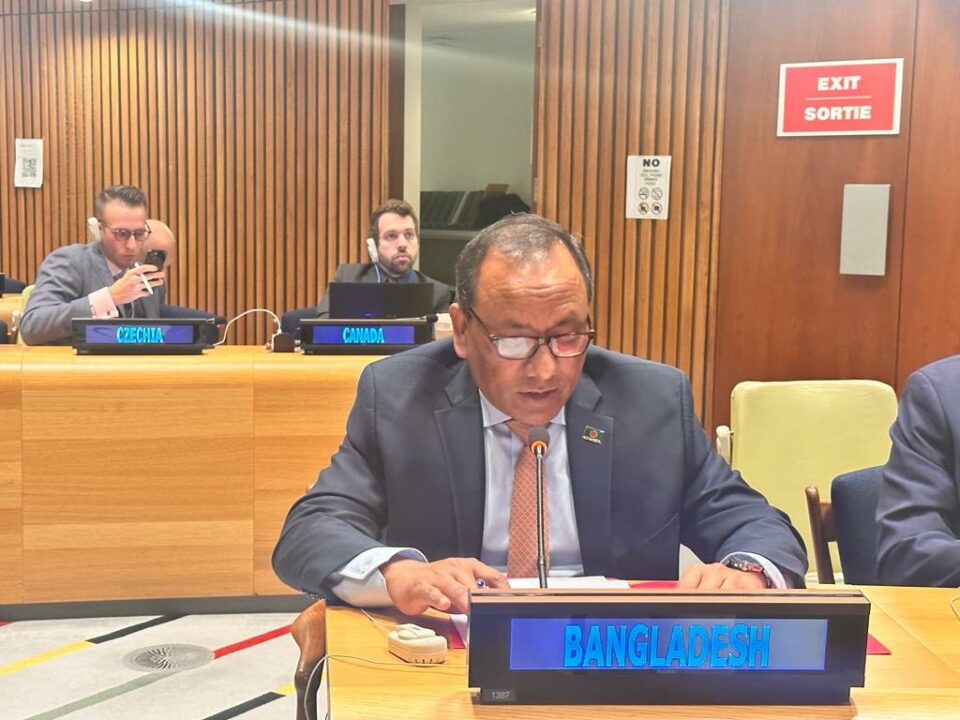Madam Chair,
Crimes against humanity constitute one of the gravest crimes against the human beings. During its Liberation War in 1971, Bangladesh experienced this crime alongside genocide and war crimes. More than three million of our people lost their lives and around two hundred thousand women lost their dignity. This painful experience has led us to take an unwavering stand against such crimes anywhere, under any circumstances.
Owing to our commitment, we ratified the Rome Statute in 2010, becoming the first country in South Asia to take such a historic step. Leveraging the principle of ‘complementarity’ enshrined in the Rome Statue, the Government established the International Crimes Tribunals to try and punish the perpetrators of the crimes against humanity committed in our territory in 1971. The Tribunal has created a good example of trying internationally defined atrocity crimes through effective national criminal justice system.
Madam Chair,
As you are aware, Bangladesh currently hosts over a million forcibly displaced Rohingyas, who faced worst forms of atrocities and human rights violations in Myanmar. We believe ensuing justice and accountability for the perpetration of the crimes hold the key to sustainable resolution of this complex and tragic crisis.
International Criminal Court is currently conducting investigation for ‘forced deportation’ of the Rohingya people from Myanmar to Bangladesh. Bangladesh is working closely with the Court in the process. We are extending full support to all other accountability mechanisms, including the Independent Investigative Mechanism on Myanmar established by the Human Rights Council. We ae also actively following the proceedings in the International Court of justice under the 1948 Genocide Convention.
Madam Chair,
The draft articles of the International Law Commission on the prevention and punishment of crimes against humanity provide a solid foundation for a potential future convention, to be shaped through inclusive and active participation by all stakeholders in the negotiation of these articles. The enabling Resolution adopted during the 77th Session of the Committee represents a significant milestone, as it facilitated the creation of an Ad Hoc Committee for in-depth discussions on the ILC articles. We have already benefited from this dedicated platform.
During the resumed session of the Committee in April 2023, member states actively engaged in the process, offering valuable insights and perspectives on each draft article. Despite differing perspectives on various provisions of these articles, this exceptional and enriching discussion significantly improved mutual understanding among Member States regarding the entire set of draft articles.
Our optimism is high as we look forward to the upcoming resumed session scheduled for April 2024. We anticipate that it will build upon the progress made so far, further deepening our comprehension of the articles, and potentially paving the way for consensus in the future.
Madam Chair,
While we work towards the conclusion of a convention based on the draft articles of the ILC, we must persist in our efforts within the existing international legal framework to prevent and punish crimes against humanity, as these crimes threaten global peace, security, and affect the realization of the global development agenda.
Although the primary responsibility for protecting its people from crimes against humanity rests with each state, there are instances where international cooperation becomes imperative when a state fails to act or prevent such crimes. In such instances, as the primary custodian of international peace and security, the UN Security Council need to play its due role in preventing and addressing these heinous crimes, including utilizing existing legal avenues like the International Criminal Court.
Nonetheless, no mechanism, be it national or international, would be effective in preventing and addressing crimes against humanity if the member States are not willing to support them or cooperate with them. We call upon member States to demonstrate genuine political will in addressing impunity and cooperate with the relevant international justice mechanisms at all stages of investigation, trial and execution of verdicts.
Before I conclude Madam Chair, we wish to denounce the ongoing armed conflict between Israel and Palestine and deplore the loss of innocent civilian lives. We believe that continued Israeli occupation and forced settlements in Palestinian territory are the root causes of instability in the region. We, therefore reiterate our support for a two-state solution, Palestine and Israel, living side by side as independent states free of occupation. Only that can bring lasting peace and stability in the region.
I thank you all.

